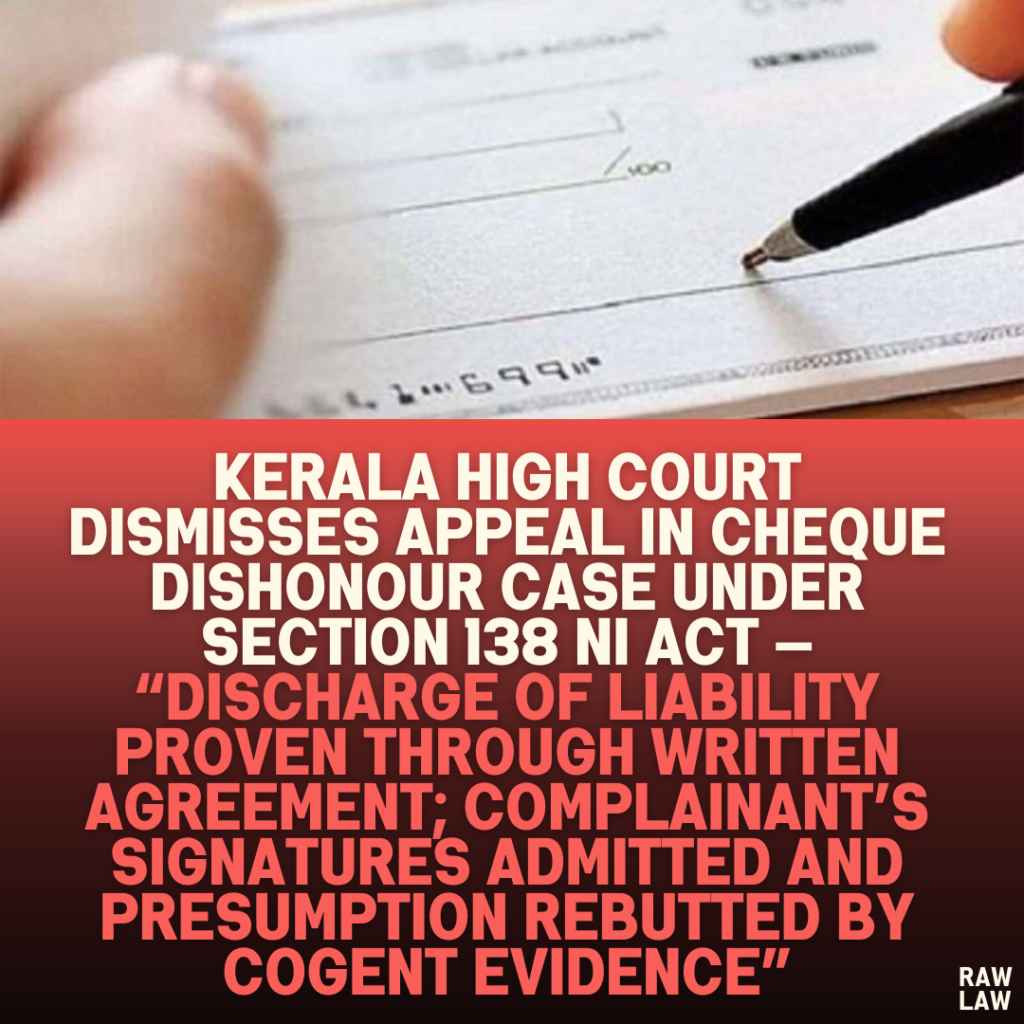Court’s Decision
The Kerala High Court dismissed a criminal appeal filed under Section 378 of the CrPC by the complainant challenging the acquittal of the accused in a Section 138 NI Act case. The Court held that the plea of discharge raised by the accused through Ext.D1 agreement was duly proved and supported by cogent evidence. Although the trial court had erroneously held that there was no enforceable debt on the date of presentation, the High Court sustained the acquittal on the ground that the liability had been discharged. The appeal was thus dismissed.
Facts
- The complainant alleged that the accused borrowed ₹6,00,000 on 16.09.2011 and issued a cheque (Ext.P1) dated 22.09.2011 for repayment.
- The cheque was dishonoured on 22.09.2011 for insufficiency of funds.
- Despite issuance of a demand notice, the amount remained unpaid.
- The complainant initiated proceedings under Section 138 of the NI Act.
- The trial court, however, acquitted the accused, accepting the defence that the debt had been discharged under an agreement dated 24.12.2011 (Ext.D1).
Issues
- Whether the trial court erred in holding that the liability under Ext.P1 was discharged by execution of Ext.D1?
- Whether the acquittal required interference by the appellate court?
Petitioner’s Arguments
- The complainant contended that the trial court’s finding — that there was no legally enforceable debt on the date of cheque presentation — was erroneous.
- It was argued that Ext.D1 agreement, dated after the cheque presentation, could not retrospectively discharge liability.
- The complainant emphasized that the presumption under Sections 118 and 139 of the NI Act was applicable once execution of the cheque was proved.
- It was further contended that non-examination of the accused himself was fatal to the defence since the complainant was deprived of the opportunity to cross-examine him regarding the alleged discharge.
- Reference was made to Rajesh Jain v. Ajay Singh, (2023) 10 SCC 148 to argue that the presumption under the NI Act stands unless rebutted by strong evidence.
Respondent’s Arguments
- The accused’s counsel submitted that Ext.D1 was validly proved through PW1, who admitted his signatures on all pages of the agreement during cross-examination.
- DW1, an attesting witness, confirmed the execution of the agreement and the repayment of ₹6 lakh.
- It was submitted that cross-examination of DW1 did not yield any evidence to discredit the discharge.
- The plea that the complainant denied execution in re-examination was not sufficient to displace the admissions already made.
Analysis of the Law
- The Court reaffirmed that once the plea of discharge is raised, the burden lies on the accused to prove it by cogent and convincing evidence.
- It reiterated that penal consequences under Section 138 cannot arise from a debt that has already been discharged.
- It clarified that although the trial court incorrectly stated that there was no legally enforceable debt at the time of presentation, the verdict of acquittal could still be upheld on the correct legal basis of discharge post-presentation.
- The Court found that the admission of signatures by PW1 and absence of any explanation from him on how Ext.D1 came into existence supported the defence version.
Precedent Analysis
- The complainant relied on Rajesh Jain v. Ajay Singh, (2023) 10 SCC 148, where the Supreme Court reiterated the statutory presumption under Sections 118 and 139 of the NI Act.
- However, the High Court distinguished the case by holding that the presumption can be rebutted by cogent evidence — which, in the present case, was satisfactorily produced through Ext.D1 and DW1’s testimony.
Court’s Reasoning
- The Court observed that: “Once plea of discharge is raised in respect of a particular amount, it is the bounden duty of the person to prove his plea of discharge by cogent and convincing evidence.”
- It held that: “Even though it is argued… that no legally sustainable evidence was adduced to prove Ext.D1, the discussion hereinabove would lead to the conclusion that the accused proved Ext.D1, rather the same is consented by PW1 by admitting his signatures therein without any further explanation.”
- It concluded that the non-examination of the accused was not fatal, as the evidence on record, including DW1’s testimony, sufficed to prove discharge.
Conclusion
The High Court upheld the acquittal of the accused, noting that:
“By proving Ext.D1 agreement, the accused succeeded in establishing the plea of discharge of the amount covered by Ext.P1. Therefore, the verdict of acquittal rendered by the trial court does not require any interference.”
The criminal appeal was dismissed and all interlocutory applications stood disposed of.
Implications
- The judgment reinforces that even after a cheque is dishonoured, a subsequent valid discharge of liability can negate the offence under Section 138 NI Act.
- It also underscores that admission of signatures and failure to explain a document’s existence can amount to admission of its contents.
- The decision affirms that acquittal under Section 138 can be sustained on grounds distinct from the trial court’s reasoning if those grounds are supported by evidence on record.



